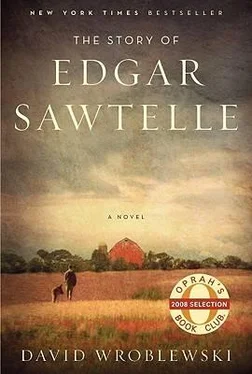Doctor Papineau, however, was entirely daunted. He tipped his chair back onto its rear legs and held his hands out. “Whoa,” he said. “Your decision. I’m not suggesting you do anything that doesn’t feel right. But think about this: eventually, something will go wrong. What are you going to do then? That’s all I’m saying. What are you going to do then?”
“YES,” TRUDY SAID, after Doctor Papineau had left. “He has a stake in the kennel. Ten percent.”
Are there others? Edgar asked.
“No. Years ago, when we were strapped for money, Page helped us out. Back then, it was impossible to get a loan, so he paid us five thousand dollars in exchange for a share in the kennel. He has obligations, though.”
That’s why you never pay him for vet work.
“Right.”
What about Claude?
“Claude sold your father his share in the kennel when your grandfather died.”
Edgar had more questions, but suddenly his mother looked exhausted, and there would be plenty of chances to ask in the morning.
TIME AND AGAIN EDGAR REREAD the letters from Brooks. They were like a puzzle to be solved. Brooks was given to proclamations and dire warnings. Pitched arguments were made for or against the importance of gait, hocks, flanks, the function of the tail; the optimum angle of the pasterns, how much this might vary between the Fortunate Fields lines and the Sawtelle dogs; whether one could ever discriminate between willingness to work and more general intelligence; whether body sensitivity was learned or inherited. The arguments often ascended into theory. Brooks sounded like a man dragging John Sawtelle into the age of science.
“I have the advantage of knowing,” he wrote, “that long after I am gone my work will provide a foundation upon which future generations of dogs, breeders, and trainers may build. Skill and talent alone are not enough. If these are bound up in you and you alone, and not in data and precisely recorded procedures, what will your efforts amount to? A few dogs-a few successes-then nothing. Only the briefest flash of light in the darkness.”
There had been some setback in 1935, though Edgar couldn’t tell what it was-some illness had flashed through the kennel, perhaps, or some spectacular training failure. In any case, it was serious enough for Brooks to shift from debate to encouragement. “There is nothing to do now but take stock of your accomplishments,” he wrote. “Now your records must serve you instead of the dogs. Study them. Look at how many of your dogs have succeeded in the world. Your records are a history of your accomplishments, John. They will show you why you undertook this work in the first place.”
Edgar had never seen his father capriciously select a dog for breeding, but in those early days, there was nothing yet to call a Sawtelle Dog-just John Sawtelle’s dogs. What drove Brooks mad was Edgar’s grandfather’s habit of spotting a dog on the street and deciding it carried some essential quality. The replies from New Jersey sometimes rose to a shriek: “How many times have we argued about this, John? Each time you do this, you introduce more variability into your bloodlines than you will ever profit by. Why do you place your trust in chance?”
Edgar arranged the letters from Brooks in chronological order. The last of them seemed to close the argument forever.
December 16, 1944
Morristown, New Jersey
John,
You may be the most stubborn man I’ve ever met. Let me rebut your points one last time, though I fear no one will ever change your mind on this. At least we are in agreement that by careful documentation of phenotype, one can increase or decrease the preponderance of a quality if one measures it objectively and reinforces it for many generations through selective breeding. The poorest farmer knows this can be done, and benefits from it: he chooses Herefords, Holsteins, or Guernseys depending on his needs. He has definite opinions on whether a Percheron or a Belgian should stand in the traces.
Likewise, we apply the scientific principles of heredity toward the perfection of a breed, so that instead of only one dog out of two litters being suitable for service, 90 percent make the grade. How are we doing this? By defining and measuring those qualities that make a good working dog. And this is where we differ. You feel less need to choose specific traits a priori, believing instead that excellent traits will simply emerge if the finest individuals, taken as a whole, are brought into the line.
Let us employ the metaphor of salt. We can’t see the salt in a glass of water, but we can taste it. Combining two slightly salty glasses and reducing them gives us a saltier result. Done enough, the invisible becomes visible: salt crystals. We may not have set out to create salt crystals, but now we have them. This is analogous to what you propose. You have cleverly arranged to work with strong brine. You don’t know what you will find if you continue to distill it, only that “this tastes ever so slightly saltier than that.” And so, by the seat of your pants, you choose one cross over another.
At Fortunate Fields, on the other hand, we not only know we are trying to produce salt crystals, we know the desired size, shape, and color of those crystals and we have carefully documented the salinity of the sire and dam of every litter, as well as their offspring.
Yet I have seen your records and you are nearly as rigorous as Fortunate Fields. I confess, our rigor and precision wearies me at times. I don’t claim our process is easy. Quite the opposite-if this were easy it would have been done long ago. But I do claim that it is the only way to obtain reliable results.
In the end, the difference between you and me comes down to the difference between the artist and the factory man. The artist does not know what he wants, but looks for good paint, good brushes, and good canvas. He trusts that talent will produce a desirable result. Sadly, for most people, it does not. The factory man says, what can I make that I can rely on? It may not be the ideal, but I must be able to tell my customers that each time they buy, they will receive the same product. The factory man values predictability above “mere” excellence for good reason-would you frequent a bakery where one cake in ten was inspired, but the other nine inedible?
I realize this portrays you as the romantic figure and me as the plodder. Perhaps you think that diminishes me. I do not. Change the analogy from bread to medicine, and you will feel the same urgency I do. You might be willing to gamble on the odd cake, but if your infant is sick, you will choose the medicine with predictable results every time. I sacrifice brilliance to make a good medicine available to mankind.
No one can say if you are that person who, given good paint, good brushes, and a fine canvas, can produce something better than the factory man. That is, and has always been, beyond the realm of science. You do have the attitude of the dreamer about you. For that reason, I haven’t the heart to argue anymore about this-it is a hopeless task. And for a simple factory man like me, an effort must be abandoned once its hopelessness is exposed. Only the artist perseveres in such circumstances.
However, I’ll leave you with a question. Suppose, guided only by intuition, you capture the greatness you seek. Never mind that you cannot define “greatness” scientifically. What makes you think you will even recognize it when it appears? Some believe that gross animal behavior may be reducible to a set of simple, indivisible traits and that only the multiplicity of ways in which those traits combine creates the illusion of complexity. Suppose you stumble across one small change with dozens of ramifications in the gross behavior of the animal? How will you know what you’ve done? How will you ever achieve it again?
Читать дальше
Конец ознакомительного отрывка
Купить книгу












